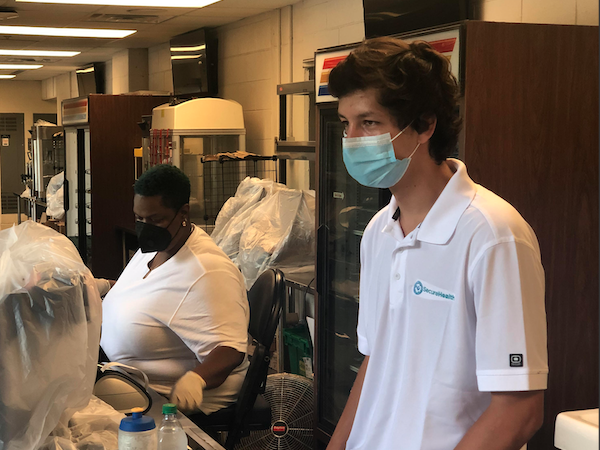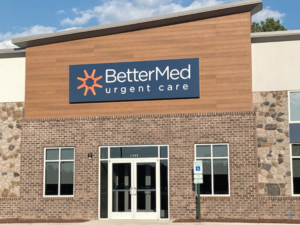
SecureHealth workers prepare to test people for coronavirus at the University of Richmond. (Courtesy SecureHealth)
A spinoff from the founders of a local urgent care chain has a new sort of patient in mind: businesses as they reopen and attempt to stay open during the pandemic.
SecureHealth, established by co-founders of BetterMed, offers on-site testing, monitoring and other support measures for companies.
BetterMed, which has eight locations in the Richmond area, is one of several urgent care companies that pivoted to coronavirus testing during the pandemic as demand for its regular services dropped off. During that time, BetterMed added testing services aimed specifically at businesses in addition to its testing of individuals.

BetterMed pivoted to coronavirus testing at some of its urgent care centers in the Richmond area. (Courtesy BetterMed)
SecureHealth was split off as a separate company in early May.
“SecureHealth was mainly born out of the need for testing during the pandemic,” said CEO Mark Rausch, who is also chief medical officer of BetterMed. “We really honed our craft. (And) we started to see the business community reach out for help.”
SecureHealth signed a deal with GRTC to provide testing and monitoring for the transit system’s employees this month. University of Richmond enlisted SecureHealth to test students. Other clients include nursing homes, manufacturers and food processors in Virginia. The company expects to test more than 20,000 people by year’s end.
“We see a need to focus strictly on businesses, to go to their sites and provide services,” Rausch said.
He said since the nature of contracts can vary, it’s difficult to provide an average cost it charges business clients. Variables include number of employees, whether a company wants a one-off testing day, or sustained service over days, weeks or months.
GRTC’s contract was set at $250,000 for on-site testing as requested, GRTC spokeswoman Carrie Rose Pace said in an email. The contract is ongoing until payments reach or exceed $250,000, and then is up for renewal.
Rausch noted that while elements of SecureHealth’s services can be found through other companies, a big part of SecureHealth’s pitch is that it’s an all-in-one solution to managing operations during the pandemic.
“There are people who are able to deliver parts of the services needed to open facilities and keep employees safe,” he said. “What we’re delivering is a truly end-to-end service.”
SecureHealth has 11 employees and operates out of a 1,000-square-foot office at 1650 Willow Lawn Drive in Henrico County. Rausch said it’s possible he could leave his role at BetterMed in favor of SecureHealth based on the future long-term demand for the spinoff’s services. BetterMed also has two locations in the Fredericksburg area and two in North Carolina.
“We’re seeing quite a bit of business and I potentially will have to pull back on my (BetterMed) roles,” he said.
SecureHealth isn’t the only local health startup to spring up in response to the pandemic. Olivian started production on protective face masks last month in Chesterfield County. The company, in coordination with Avail Vapor sister company Blackbriar Regulatory Services, plans to ramp up production to 40 million masks a month.

SecureHealth workers prepare to test people for coronavirus at the University of Richmond. (Courtesy SecureHealth)
A spinoff from the founders of a local urgent care chain has a new sort of patient in mind: businesses as they reopen and attempt to stay open during the pandemic.
SecureHealth, established by co-founders of BetterMed, offers on-site testing, monitoring and other support measures for companies.
BetterMed, which has eight locations in the Richmond area, is one of several urgent care companies that pivoted to coronavirus testing during the pandemic as demand for its regular services dropped off. During that time, BetterMed added testing services aimed specifically at businesses in addition to its testing of individuals.

BetterMed pivoted to coronavirus testing at some of its urgent care centers in the Richmond area. (Courtesy BetterMed)
SecureHealth was split off as a separate company in early May.
“SecureHealth was mainly born out of the need for testing during the pandemic,” said CEO Mark Rausch, who is also chief medical officer of BetterMed. “We really honed our craft. (And) we started to see the business community reach out for help.”
SecureHealth signed a deal with GRTC to provide testing and monitoring for the transit system’s employees this month. University of Richmond enlisted SecureHealth to test students. Other clients include nursing homes, manufacturers and food processors in Virginia. The company expects to test more than 20,000 people by year’s end.
“We see a need to focus strictly on businesses, to go to their sites and provide services,” Rausch said.
He said since the nature of contracts can vary, it’s difficult to provide an average cost it charges business clients. Variables include number of employees, whether a company wants a one-off testing day, or sustained service over days, weeks or months.
GRTC’s contract was set at $250,000 for on-site testing as requested, GRTC spokeswoman Carrie Rose Pace said in an email. The contract is ongoing until payments reach or exceed $250,000, and then is up for renewal.
Rausch noted that while elements of SecureHealth’s services can be found through other companies, a big part of SecureHealth’s pitch is that it’s an all-in-one solution to managing operations during the pandemic.
“There are people who are able to deliver parts of the services needed to open facilities and keep employees safe,” he said. “What we’re delivering is a truly end-to-end service.”
SecureHealth has 11 employees and operates out of a 1,000-square-foot office at 1650 Willow Lawn Drive in Henrico County. Rausch said it’s possible he could leave his role at BetterMed in favor of SecureHealth based on the future long-term demand for the spinoff’s services. BetterMed also has two locations in the Fredericksburg area and two in North Carolina.
“We’re seeing quite a bit of business and I potentially will have to pull back on my (BetterMed) roles,” he said.
SecureHealth isn’t the only local health startup to spring up in response to the pandemic. Olivian started production on protective face masks last month in Chesterfield County. The company, in coordination with Avail Vapor sister company Blackbriar Regulatory Services, plans to ramp up production to 40 million masks a month.


